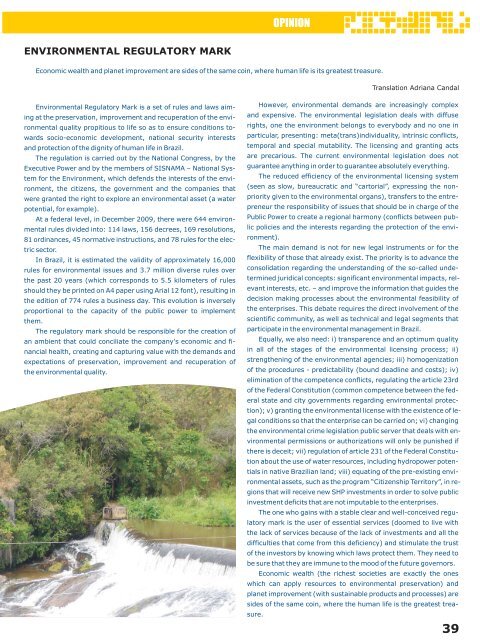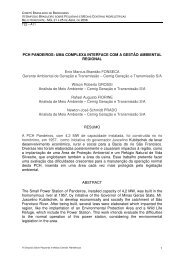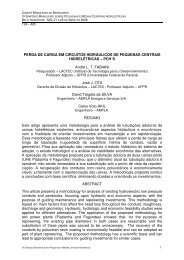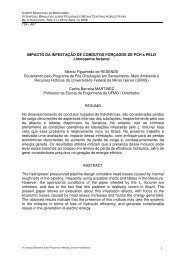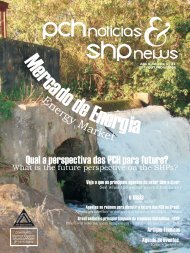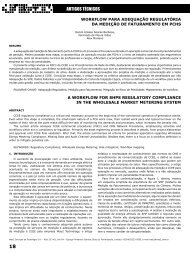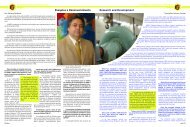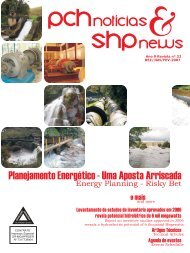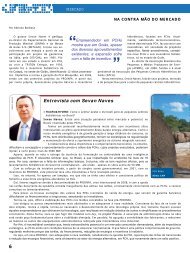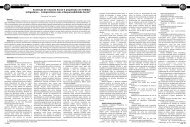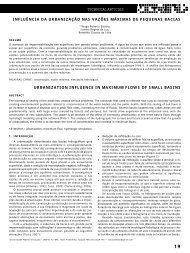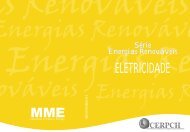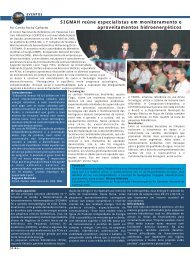03 - CERPCH - Unifei
03 - CERPCH - Unifei
03 - CERPCH - Unifei
You also want an ePaper? Increase the reach of your titles
YUMPU automatically turns print PDFs into web optimized ePapers that Google loves.
ENVIRONMENTAL REGULATORY MARK<br />
OPINION<br />
Economic wealth and planet improvement are sides of the same coin, where human life is its greatest treasure.<br />
Environmental Regulatory Mark is a set of rules and laws aiming<br />
at the preservation, improvement and recuperation of the environmental<br />
quality propitious to life so as to ensure conditions towards<br />
socio-economic development, national security interests<br />
and protection of the dignity of human life in Brazil.<br />
The regulation is carried out by the National Congress, by the<br />
Executive Power and by the members of SISNAMA – National System<br />
for the Environment, which defends the interests of the environment,<br />
the citizens, the government and the companies that<br />
were granted the right to explore an environmental asset (a water<br />
potential, for example).<br />
At a federal level, in December 2009, there were 644 environmental<br />
rules divided into: 114 laws, 156 decrees, 169 resolutions,<br />
81 ordinances, 45 normative instructions, and 78 rules for the electric<br />
sector.<br />
In Brazil, it is estimated the validity of approximately 16,000<br />
rules for environmental issues and 3.7 million diverse rules over<br />
the past 20 years (which corresponds to 5.5 kilometers of rules<br />
should they be printed on A4 paper using Arial 12 font), resulting in<br />
the edition of 774 rules a business day. This evolution is inversely<br />
proportional to the capacity of the public power to implement<br />
them.<br />
The regulatory mark should be responsible for the creation of<br />
an ambient that could conciliate the company's economic and financial<br />
health, creating and capturing value with the demands and<br />
expectations of preservation, improvement and recuperation of<br />
the environmental quality.<br />
Translation Adriana Candal<br />
However, environmental demands are increasingly complex<br />
and expensive. The environmental legislation deals with diffuse<br />
rights, one the environment belongs to everybody and no one in<br />
particular, presenting: meta(trans)individuality, intrinsic conflicts,<br />
temporal and special mutability. The licensing and granting acts<br />
are precarious. The current environmental legislation does not<br />
guarantee anything in order to guarantee absolutely everything.<br />
The reduced efficiency of the environmental licensing system<br />
(seen as slow, bureaucratic and “cartorial”, expressing the nonpriority<br />
given to the environmental organs), transfers to the entrepreneur<br />
the responsibility of issues that should be in charge of the<br />
Public Power to create a regional harmony (conflicts between public<br />
policies and the interests regarding the protection of the environment).<br />
The main demand is not for new legal instruments or for the<br />
flexibility of those that already exist. The priority is to advance the<br />
consolidation regarding the understanding of the so-called undetermined<br />
juridical concepts: significant environmental impacts, relevant<br />
interests, etc. – and improve the information that guides the<br />
decision making processes about the environmental feasibility of<br />
the enterprises. This debate requires the direct involvement of the<br />
scientific community, as well as technical and legal segments that<br />
participate in the environmental management in Brazil.<br />
Equally, we also need: i) transparence and an optimum quality<br />
in all of the stages of the environmental licensing process; ii)<br />
strengthening of the environmental agencies; iii) homogenization<br />
of the procedures - predictability (bound deadline and costs); iv)<br />
elimination of the competence conflicts, regulating the article 23rd<br />
of the Federal Constitution (common competence between the federal<br />
state and city governments regarding environmental protection);<br />
v) granting the environmental license with the existence of legal<br />
conditions so that the enterprise can be carried on; vi) changing<br />
the environmental crime legislation public server that deals with environmental<br />
permissions or authorizations will only be punished if<br />
there is deceit; vii) regulation of article 231 of the Federal Constitution<br />
about the use of water resources, including hydropower potentials<br />
in native Brazilian land; viii) equating of the pre-existing environmental<br />
assets, such as the program “Citizenship Territory”, in regions<br />
that will receive new SHP investments in order to solve public<br />
investment deficits that are not imputable to the enterprises.<br />
The one who gains with a stable clear and well-conceived regulatory<br />
mark is the user of essential services (doomed to live with<br />
the lack of services because of the lack of investments and all the<br />
difficulties that come from this deficiency) and stimulate the trust<br />
of the investors by knowing which laws protect them. They need to<br />
be sure that they are immune to the mood of the future governors.<br />
Economic wealth (the richest societies are exactly the ones<br />
which can apply resources to environmental preservation) and<br />
planet improvement (with sustainable products and processes) are<br />
sides of the same coin, where the human life is the greatest treasure.<br />
39


